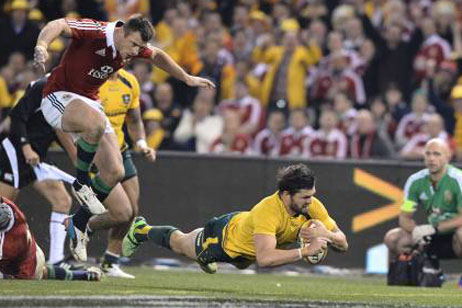In a previous lifetime, an exchange student taken into our household gave me a gift. It was a garish necktie, quite long, with diagonal stripes of red, white and, I think, green. Maybe blue, too. Pretty sure I never wore it; it was that startling.
I remember it being encased in a plastic sleeve and on the fat end of the tie were the words: “British & Irish Lions”. And I vaguely recall that he thought it was a nice gift, and I was bright enough to be grateful.
I knew it had to do with rugby, which the exchange student had played, back in Wales … and now, 17 years later, I quite clearly know about the British & Irish Lions, one of the more curious sports concepts of the many and varied curious concepts which make up British (and Irish) sports.
In short: The British & Irish Lions are an all-star rugby team from the British Isles which assembles once every four years and treks to the southern hemisphere to play matches against local clubs and, eventually, against that country’s national side.
It is a very big deal anywhere Brits may have settled. Such as the UAE. We at The National ran a major preview piece extolling the history (since 1888!) and traditions of the tour even before it began.
And today, the B&L Lions lost a crucial match in Australia, and the reaction of many Britons is not dissimilar to what you might expect from American football fans when their team has lost the Super Bowl. By one point.
In a way, a Lions tour is a bit like a soccer World Cup or the Olympics, in that it comes around only once every four years. Lots and lots of anticipation, then, and then weeks and week of the squad being “down under”.
They travel to New Zealand, South Africa and, this time, Australia and the tour goes on for five weeks. Maybe more.
The Lions thrashed all the non-national-team opposition thrown at them (with one exception, a narrow loss to an Australian club, by the Lions’ second team, basically). That whole concept was bizarre, too. Like sending a U.S. national basketball team to Spain, and they spend weeks playing Spanish club teams, and only in the final 15 days do they get around to playing the national team. Could cut to the chase; but the tour would be three weeks, sted five. Less tour-y.
So, finally, a week ago, the Lions played Australia’s national team (known as the Wallabies), and the Lions won a narrow, 23-21 victory in which the Aussies missed a winning kick on the final play of the game.
It is a best-of-three series, so the Lions were on the verge of clinching their first “test” series since 1997. (They rightly point out it’s difficult to win a series on the underside of the globe, where the crowds are against you and the environs are unknown and shifting, and, too, water swirls down drains in the wrong direction.)
Game 2 was today, and this time Australia won 16-15. And to many Britons it was like their dog had died. Hard times.
Rugby is an interesting game, probably slightly more popular in Britain than cricket, at this point. Here in the UAE, rugby seems far more popular, among Westerners, than cricket, especially in Dubai. Among subcontinenters, though, cricket is huge and rugby is pretty much nowhere.
The idea of large men crashing into each other is certainly not unknown in the U.S. But some of the rules elude me, and club rugby is not quite high-profile enough for us to pay rapt attention to it.
(Plus, I don’t get the TV station, here in Abu Dhabi, that carries rugby. It is not the droning background noise of months on end, as cricket often is.)
For me, rugby has the drawing power of a football game if you did not quite know all the rules. You do find yourself watching. Lots of people (15 a side) running around, playing positions with ridiculous names (loose-head prop?) but perhaps no more ridiculous than football names sound to a Briton (tight end?).
When living in Hong Kong, five years ago, we often found ourselves watching rugby, just because it was colorful and full of action and was part of the basic cable there. But we do not have the almost tribal attachment to any team, or to any national side. Of course.
So, now we wait for the grand finale, Game 3 in the test series, next Saturday.
Given their modern history with soccer, Britons (or the English, certainly) have deep experience with sports disappointment, and if they are deflated by a result they seem to bounce back quickly, since their soccer team hasn’t won anything important since 1966 and generally loses painfully. Usually in a shootout.
So, next Saturday, no question what is the big event for Britain, and Australians. And for The National.
And, yes, Chris … that tie you gave me long ago, the garish one … I now know quite well it was a very fine gift, indeed.


0 responses so far ↓
There are no comments yet...Kick things off by filling out the form below.
Leave a Comment